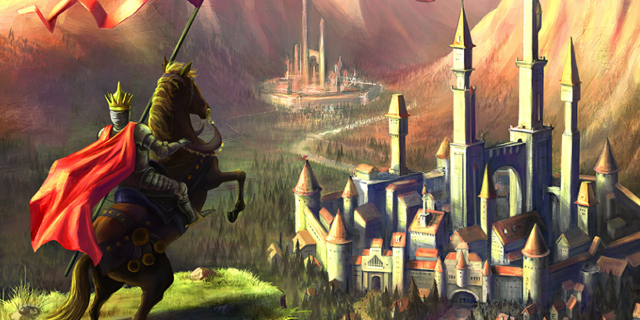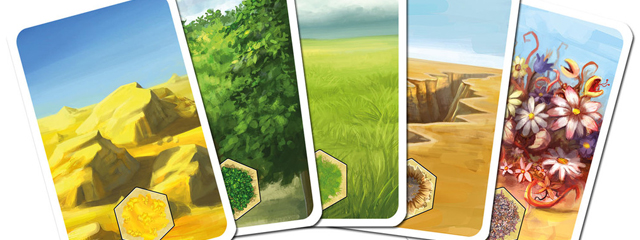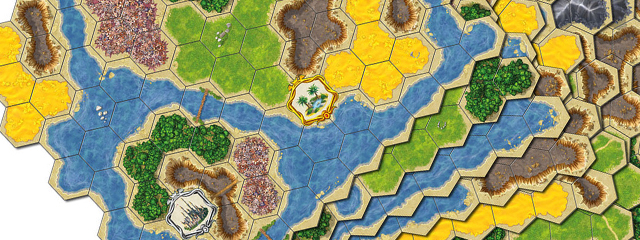
Dominion designer Donald X. Vaccarino has put together another winning mid-weight gaming experience in Kingdom Builder (published by Queen Games). Ideal for both a “gateway” game for new strategy gamers and as a filler for gaming veterans, Kingdom Builder plays fast and has very simple rules, and yet provides enough game to offer a decent challenge. It’s never going to be the centerpiece of game night, but as a warm-up groups could do far worse.
Four of the eight modular tiles are combined to create the game board, each featuring various terrains and structures. The reverse side of any unused board can be used for scoring, although this isn’t really necessary and won’t even be needed until the end of the game. Two tiles for each non-castle structure are placed on the corresponding spaces, and reminder tiles for the structures’ powers are placed along their respective boards. Each player (up to four) receives forty settlements (buildings) and one terrain card. Three scoring cards are revealed and will be the only way (save for castles) that points are earned for this session.

On a player’s turn, they reveal their terrain card and must place three settlements in the indicated terrain. Although the three settlements placed in a round do not necessarily have to be adjacent to each other, settlements must always be placed in a continuous group(s) (“settlement areas”) whenever possible; the key to strategy in Kingdom Builder is to arrange for this to not be possible as often as you can, in order to maximize your placement choices. This is easier said than done, however, partially thanks to the random draw forcing your hand (especially early on).
Placing a settlement adjacent to a structure earns you either points (if a castle) or an additional ability that can be used on subsequent turns (before or after placing your three settlements). These special abilities generally allow you either to place extra settlements or to move existing settlements, although the specific manner in which they operate is different for each one: some are tied to your terrain card for the round, while others are specific to individual terrain types (or board locations). In addition to scoring points and maximizing placement potential, careful settlement placement can also be used to deny important locations from opponents. Only one settlement can be built on any given space, adding some “light cycle” wall-building into strategy. Your turn ends by drawing a new terrain card. The game ends when a player has run out of settlements, although all players receive the same number of turns.

Scoring is determined almost solely by the three cards revealed at the start of the game (of ten available). These will reward you for various tasks, like having a settlement in as many horizontal rows of the board as possible, connecting structures with a chain of settlements, or building settlements adjacent to water. A few of these goals can be somewhat contradictory (e.g., “most individual settlement areas” versus “largest settlement area”) but that just gives you more options.
Players also score three points for each castle at which they have an adjacent settlement. It is important to note that this award is per castle, not per settlement, which is a common mistake for newer players. Other than that, the game’s biggest— and really only— flaw is how a couple of bad early draws can completely screw you. Many players opt to use a variant where each player is dealt two cards at the start of the game, playing one, and then either discarding the second or keeping it for their next turn before continuing as normal from there on out. It’s a minor change, but the difference between the normal rules and this variant can be significant.
Heavy-weight cardboard and a lot of wooden buildings force Kingdom Builder to retail for around $60. That’s a bit much for a gateway/filler game, but probably worth it considering the number of times you’re likely to play it over the game’s lifetime. A game of Kingdom Builder rarely takes more than half an hour, and a two-player game with even novices can be completed in about fifteen minutes assuming no overly-thought turns. The recommended age is eight and up, as the score cards and special abilities can be a little arcane (detailed descriptions are in the instructions) but are simple enough to grasp after a few plays.



















